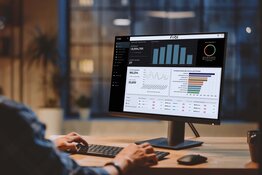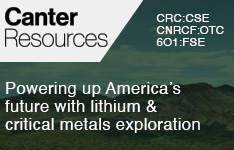First Hydrogen Corp. (FHYD:TSX; FHYDF:OTC; FIT:FSE) announced that its fourth hydrogen fuel cell-powered vehicle (FCEV) trial taking place with a large multinational logistics company in London is proceeding well, and it expects to give a detailed report later in May.
The company also noted it has started discussions with a country-wide industrial fleet operator in Mexico to update their vehicles to hydrogen-powered fuel cells, as well as adding FCEVs to their fleet and deploying a hydrogen refueling stations (HRS) infrastructure across the country.
"Mexico's hydrogen trade body, Asociación Mexicana de Hidrógeno (AMH), states there are at least 15 projects under development in Mexico, worth a total capex investment of US$20 billion," First Hydrogen noted in a release.
Hydrogen Insight estimated that the US$20 billion would facilitate nearly 7 gigawatts (GW) of green hydrogen.
Headquartered in Vancouver, British Columbia, First Hydrogen said it is working to help decarbonize the transportation sector in Europe and North America by manufacturing hydrogen FCEVs and producing and distributing the clean power on which they will run. This closed-loop solution to the vehicle emissions problem addresses supply and demand, the company said.
"First Hydrogen has demonstrated how its fuel cell's powertrain delivers power when needed, achieving outputs of 60kW in transient accelerations, and in previous trials, the vehicle has achieved a peak range of 630 kilometers (400 miles) on a single refueling," First Hydrogen said. "This indicates the vehicle can manage more demanding duties, such as carrying heavier payloads, driving over hilly terrain, or powering auxiliary equipment (onboard power)."
The Catalyst: Parcel Market to Deliver Big
According to Global Market Insights, the parcel delivery vehicle market is projected to surpass US$210 billion by 2032.
"The need for quicker and more effective delivery services has led to an increase in technological developments," researchers said. "Consumers today also demand speedy and dependable delivery of their items, which puts pressure on delivery services to find methods that streamline their processes and cut costs. The rising demand for single-day or two-day deliveries will fuel market expansion."
Stellar Market Research also noted the parcel delivery market was poised to jump from US$486.47 billion in 2023 to US$648.84 billion by 2030.
Hydrogen Insight estimated that the US$20 billion would facilitate nearly 7 gigawatts (GW) of green hydrogen.
"Consumers are ordering more online due to e-commerce expansion and the COVID-19 epidemic, which is fueling the parcel delivery sector," Stellar analysts noted. "This resulted in a 37% increase in volume, with 20 billion parcels carried in the United States, and a 29% increase in income, reaching US$171 billion in 2020."
First Hydrogen noted that companies using hydrogen fuel cells can significantly reduce their carbon footprint since they emit only water and heat.
"When utilized with green hydrogen, the FCEVs will be completely greenhouse gas emission-free," the company said. "FCEVs produce no harmful tailpipe emissions, with the only byproduct being water. This is a stark contrast to gasoline and diesel vehicles, which emit tailpipe pollutants such as nitrogen oxides, hydrocarbons, and particulate matter."
Some of its main advantages include energy efficiency, longer ranges compared to electric vehicles (EVs), scalability, versatility, and reduced dependence on fossil fuels.
Projects Underway Worldwide
In a recent update on first-quarter developments, Chief Executive Officer Balraj Mann said the company was "building strong relationships with governments, potential customers, and suppliers, aligning the need to reduce emissions and First Hydrogen's product offering."
First Hydrogen has projects in development and underway in Canada, the United Kingdom, and the European Union, in regions with governmental support, aggressive emissions targets, and carbon reduction strategies in place. It also has offices in Montreal, Quebec, and London.
Three earlier trials of the FCEVs were done in real-world conditions in London, Scotland, and Wales & West Utilities (WWU).
Stellar Market Research also noted the parcel delivery market was poised to jump from US$486.47 billion in 2023 to US$648.84 billion by 2030.
Two members of WWU's emergency and metering services team drove First Hydrogen's hydrogen fuel cell-powered van while performing their job duties that involved driving and responding to customer calls, an average of five to six per day, with bulky equipment on board for making repairs.
During some of South Wales' coldest weather, the first call operatives drove a total of 2,000 kilometers, or 1,200 miles, the longest distance of any of First Hydrogen's vehicle trials to date.
"The fact you can quickly refuel rather than charge up overnight is a massive advantage for us, as sometimes we respond to calls from our homes in the middle of the night," said one of the drivers in the Wales trial, Alun Jones.
 Streetwise Ownership Overview*
Streetwise Ownership Overview*
First Hydrogen Corp. (FHYD:TSX; FHYDF:OTC; FIT:FSE)
Ownership and Share Structure
As for ownership, according to the company, two insiders hold 3.49%, or 2.53 million (2.53M) shares, of First Hydrogen. From most to least interest held, these insiders are Chairman, Chief Executive Officer Balraj Mann with 2.26% or 1.64M shares, and Chief Financial Officer Edward Low with 1.23% or 0.89M shares (based on SEDI.CA insider filings).
One institutional owner, Fuchs & Associés Finance SA, holds 0.01% or 0.01 million shares.
Retail investors own the remaining.
Regarding the share structure, First Hydrogen has 72.43M outstanding shares and 67.36M free float traded shares.
Its market cap is CA$72.43 million. Its stock has traded between CA$0.90 and CA$3.30 per share over the past 52 weeks.
| Want to be the first to know about interesting Technology, Clean Energy, Alternative - Cleantech and Alternative Energy investment ideas? Sign up to receive the FREE Streetwise Reports' newsletter. | Subscribe |
Important Disclosures:
- First Hydrogen Corp. has a consulting relationship with an affiliate of Streetwise Reports, and pays a monthly consulting fee between US$8,000 and US$20,000.
- As of the date of this article, officers and/or employees of Streetwise Reports LLC (including members of their household) own securities of First Hydrogen Corp.
- Steve Sobek wrote this article for Streetwise Reports LLC and provides services to Streetwise Reports as an employee.
- This article does not constitute investment advice and is not a solicitation for any investment. Streetwise Reports does not render general or specific investment advice and the information on Streetwise Reports should not be considered a recommendation to buy or sell any security. Each reader is encouraged to consult with his or her personal financial adviser and perform their own comprehensive investment research. By opening this page, each reader accepts and agrees to Streetwise Reports' terms of use and full legal disclaimer. Streetwise Reports does not endorse or recommend the business, products, services or securities of any company.
For additional disclosures, please click here.



































